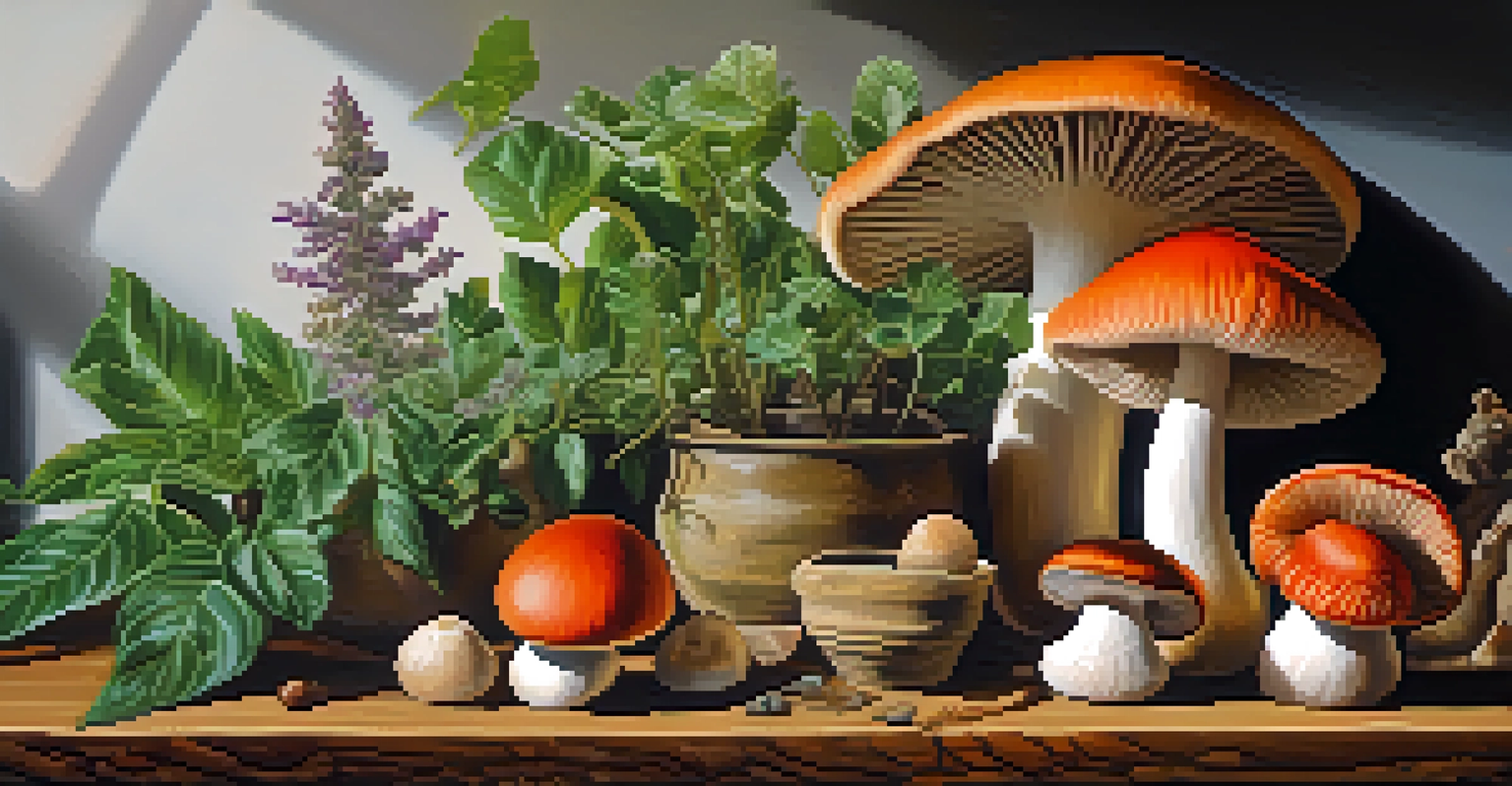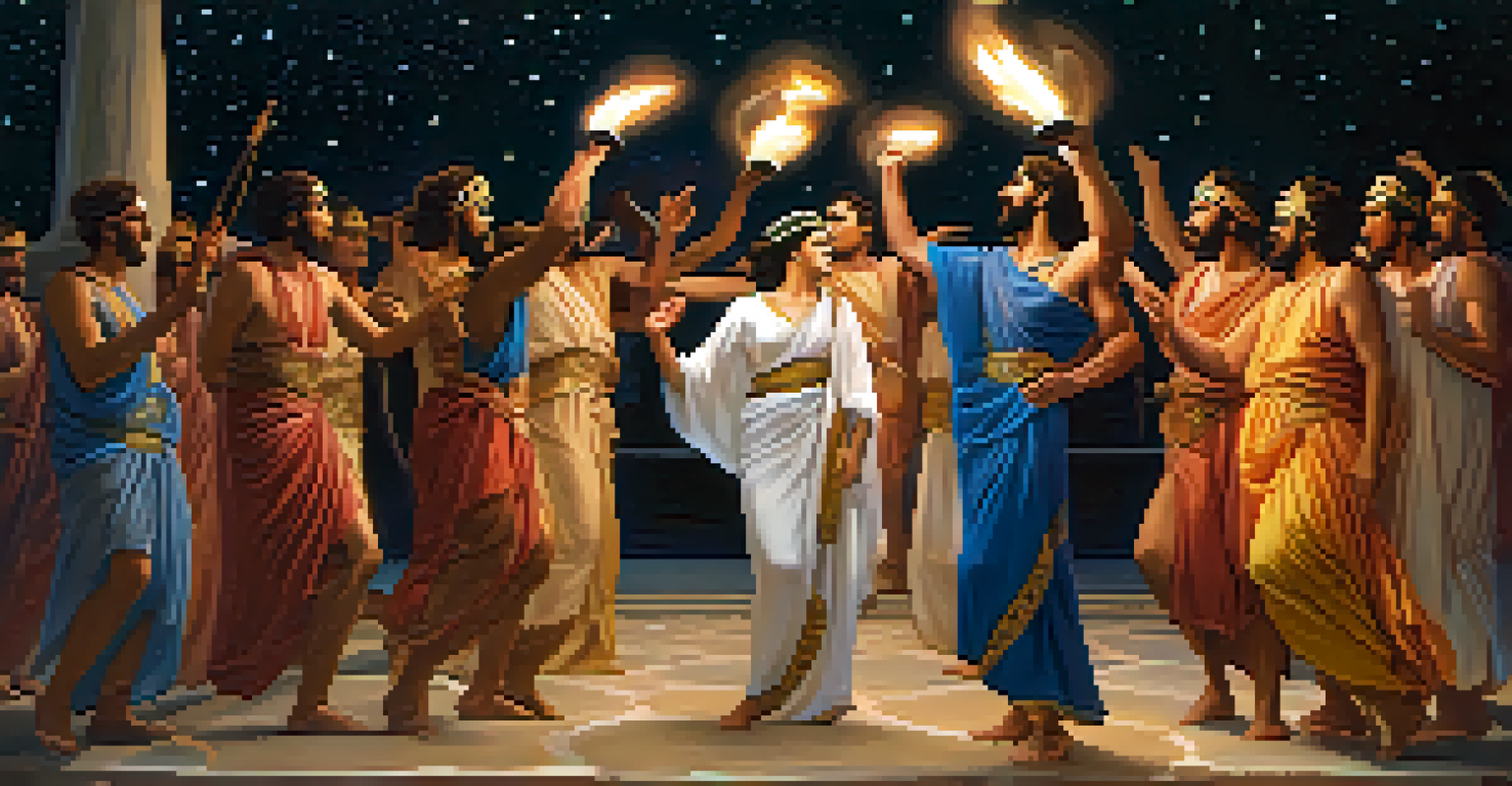Rituals of the Ancient Greeks: Entheogens and Divine Insights

Understanding Entheogens in Ancient Greek Culture
Entheogens, substances that inspire spiritual experiences, played a significant role in ancient Greek rituals. The Greeks believed these substances could bridge the gap between the mortal and divine, offering insights that were otherwise unreachable. Commonly associated with the Eleusinian Mysteries, entheogens were thought to facilitate revelations and connection with the gods.
The ancient Greeks believed that the use of psychoactive substances could lead to divine insights and transformative experiences.
These rituals were not merely for entertainment; they held deep spiritual significance. Participants sought transformation and enlightenment, hoping to understand their place in the cosmos. Through the use of specific plants and substances, they aimed to experience altered states of consciousness that revealed divine truths.
Related Resource
The careful selection and preparation of these entheogens were crucial. Ancient texts hint at a well-guarded knowledge surrounding their use, indicating that it was a sacred practice reserved for initiates. This secrecy added to the allure and mystery of the rituals, emphasizing their importance in Greek spirituality.
The Eleusinian Mysteries: A Key Ritual
One of the most famous rituals involving entheogens was the Eleusinian Mysteries, dedicated to Demeter and Persephone. This festival drew thousands from across the Greek world, highlighting its significance in ancient society. Participants underwent a series of rites that promised transformative experiences, often facilitated by the use of entheogenic substances.

During the initiation, the use of kykeon—a beverage made from barley and possibly psychoactive ingredients—was central. This drink was thought to induce visions and insights, allowing participants to glimpse the divine realm. The experience was described as both terrifying and enlightening, a duality that reflects the complexity of spiritual journeys.
Entheogens and Spiritual Insights
Ancient Greeks used entheogens in rituals to facilitate spiritual experiences, fostering personal transformation and divine connection.
The Eleusinian Mysteries were not just about personal enlightenment; they reinforced community bonds. As participants shared their experiences, they fostered a sense of belonging and collective understanding. This communal aspect of the rituals highlights how entheogens served not only the individual seeker but also the broader society.
Psychoactive Plants in Ancient Greek Rituals
Various psychoactive plants were integral to Greek rituals, each chosen for their unique effects. For instance, the use of hallucinogenic mushrooms and other botanicals provided pathways to altered states of consciousness. These plants were often gathered and prepared with great care, reflecting the deep respect Greeks had for nature's gifts.
The Eleusinian Mysteries were the most important of the secret rites of ancient Greece, promising initiates a glimpse into the afterlife and a personal connection to the divine.
The experience of consuming these plants was often described in mystical terms. Participants reported visions, profound insights, and a sense of unity with the universe. This connection to nature and the divine illustrates how the Greeks viewed their environment as a source of spiritual wisdom.
Related Resource
While these plants were powerful, the Greeks understood the importance of moderation and guidance. The rituals were typically led by experienced practitioners who ensured participants navigated their experiences safely. This balance between exploration and caution underscores the sophisticated understanding the Greeks had of entheogens.
The Role of Music and Dance in Rituals
Music and dance were vital components of Greek rituals, enhancing the use of entheogens. The rhythmic sounds and movements created an immersive environment that facilitated spiritual experiences. Participants often reported that the combination of music, dance, and entheogens led to heightened emotional states and deeper insights.
In many rituals, specific instruments like the lyre and aulos (a double-reed instrument) were used to evoke particular moods. The melodies created a sacred space, inviting divine presence and encouraging participants to open up to their experiences. This synergy between sound, movement, and substance was key to the transformative power of the rituals.
Eleusinian Mysteries' Importance
The Eleusinian Mysteries, dedicated to Demeter and Persephone, exemplified how entheogens united individuals and communities through shared transformative experiences.
Moreover, dance served as a form of expression and release. Participants could channel their emotions and experiences through movement, which further deepened their connection to the divine. This interplay between music, dance, and entheogens illustrates the holistic approach the Greeks took toward spiritual exploration.
Divine Insights: The Aftermath of Rituals
The aftermath of engaging with entheogens in Greek rituals often led to profound insights and changes in perspective. Many participants reported a lasting sense of clarity and purpose following their experiences. These divine insights were not just personal revelations; they often inspired individuals to change their lives in meaningful ways.
Ancient Greeks believed that these insights were gifts from the gods, guiding them in their daily lives. The experiences could lead to new understandings of morality, community, and one’s place in the universe. This transformative aspect of the rituals highlights the enduring impact of such spiritual practices on individuals and society.
Related Resource
Furthermore, the insights gained from these experiences were sometimes shared publicly, influencing art, philosophy, and politics. The ripple effects of these divine moments contributed to the richness of Greek culture, emphasizing the interconnectedness of spirituality and daily life.
The Decline of Entheogenic Practices
As the ancient Greek civilization evolved, the use of entheogens in religious practices began to decline. Various factors contributed to this shift, including the rise of more structured religious practices and the spread of Christianity. The once-celebrated rituals gradually fell out of favor, leading to a loss of the associated knowledge and traditions.
The decline also reflected changing societal values, where personal spiritual experiences were overshadowed by dogma and institutionalized religion. This shift marked a significant transformation in how people sought divine insights, moving away from the direct, experiential approach of the ancients.
Revival of Ancient Practices Today
Modern interest in entheogens reflects a return to ancient Greek practices as people seek personal growth and deeper connections to spirituality.
Despite this decline, the legacy of these practices endures. Contemporary interest in entheogens and their potential for spiritual exploration can often be traced back to these ancient traditions. Understanding the historical context of these practices can enrich modern discussions about spirituality and consciousness.
Modern Reflections on Ancient Greek Rituals
Today, there is a renewed interest in the spiritual practices of the ancient Greeks, particularly regarding entheogens. Many people are exploring these substances for personal growth, healing, and connection to the divine. This modern exploration often draws inspiration from the rituals and insights of ancient Greece.
The parallels between ancient practices and contemporary spiritual exploration highlight the timeless quest for understanding and connection. As individuals seek to navigate the complexities of modern life, the wisdom of the past can provide valuable guidance. The stories and experiences of the ancients serve as a rich tapestry from which to draw inspiration.

Moreover, the discussion surrounding entheogens today is increasingly framed within a larger context of mental health and wellness. As society becomes more open to exploring altered states of consciousness, the ancient Greeks' practices offer a historical lens through which to view these modern experiences. This connection underscores the enduring relevance of ancient rituals in our quest for meaning.